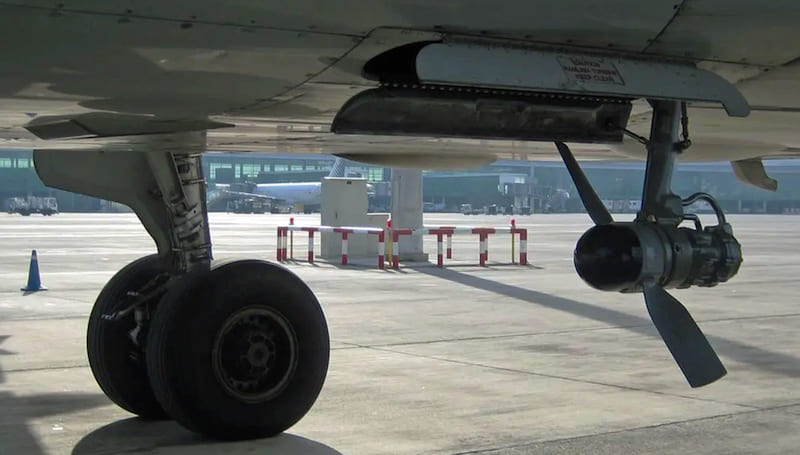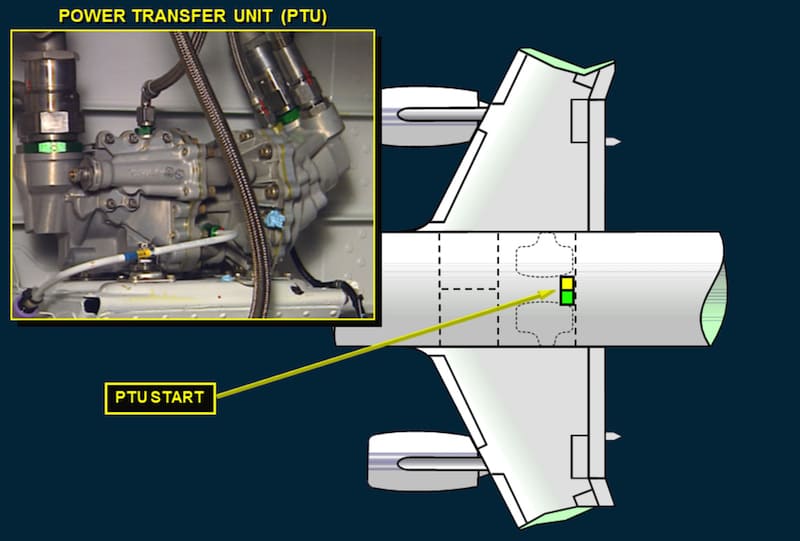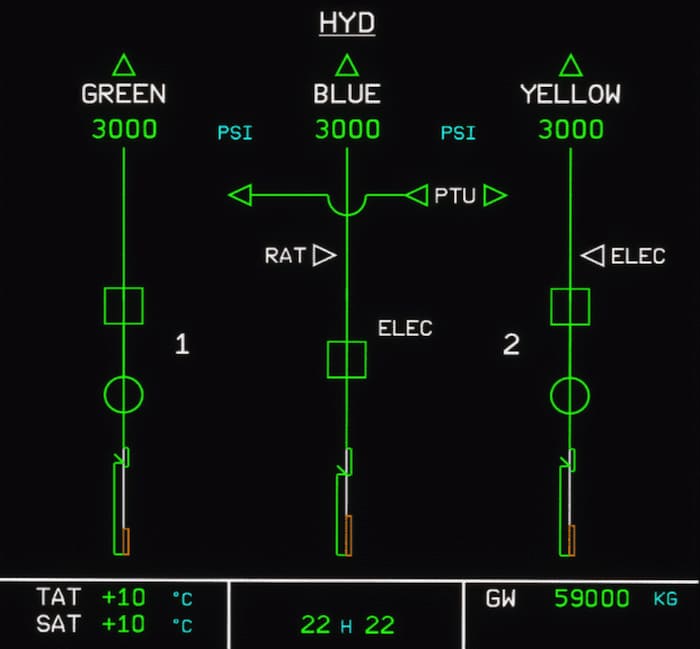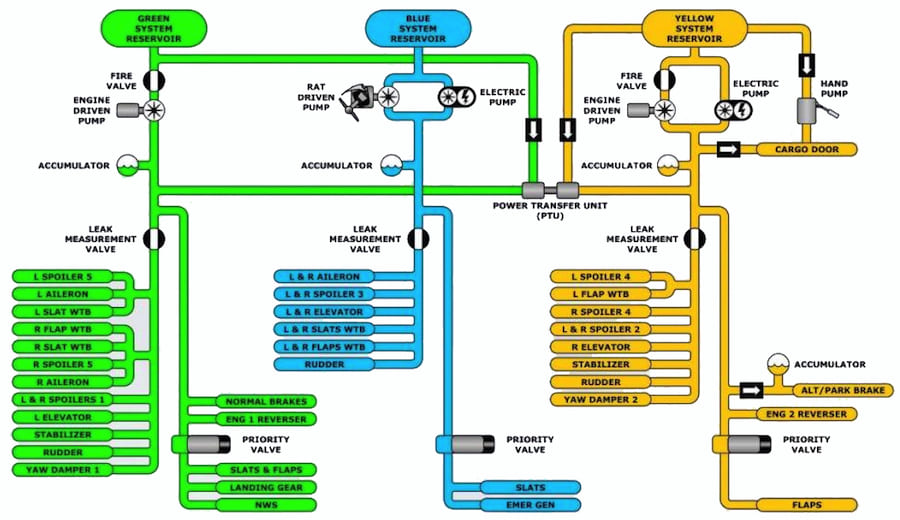The PTU is automatically inhibited:
The PTU is automatically inhibited during the first engine start and automatically tested during the second engine start.
Is it possible to check RAT's position and status?
The PTU FAULT light comes ON and a caution appears on the ECAM if:

The BLUE hydraulic system operates the:
The YELLOW hydraulic system comprises:
A pump driven by engine 2 pressurizes the yellow system. An electric pump can also pressurize the yellow system, which allows yellow hydraulics to be used on the ground when the engines are stopped. Crew members can also use a hand pump to pressurize the yellow system in order to operate the cargo doors when no electrical power is available.
In order to pressurize the GREEN hydraulic system when both engines are NOT running.
An electric pump can pressurize the YELLOW system, which allows YELLOW hydraulics to be used on the ground when the engines are stooped. The PTU (Power Transfer Unit) comes into action when the differential pressure between the GREEN and the YELLOW systems is greather than 500 psi. The PTU therefore allows the green system to be pressurized on the ground when the engines are stopped.
When the YELLOW electric pump is automatically activated, it inhibits the operation of the other YELLOW system functions except:
The YELLOW electric pump pushbutton is set to OFF. If a crewman sets the lever of the cargo door manual selector valve to OPEN or CLOSE position, the PTU and the Flight Controls will be:
It comes on automatically when someone sets the lever of the cargo door manual selector valve to OPEN or CLOSE. This inhibits the operation of other yellow system functions (except alternate braking and engine 2 reverse).
In case of a hydraulic malfunction, the RAT will deploy:
Hydraulic power for the landing gear extension and retraction is provided by the:
Advertisement
The RAT (Ram Air Turbine) pressurizes the BLUE hydraulic system to approximately:
Normal system pressure is 3000 psi (2500 psi when powered by the RAT).
Priority valves cut off hydraulic power to heavy load users if hydraulic pressure in a system gets low.
If electrical power fails when the Yellow system ELEC PUMP is operating, the pump remains off until the switch is cycled off and on after power has been restored.

Normally, HP bleed air from engine 1 pressurizes the hydraulic reservoirs automatically. If the bleed air pressure is too low or too high, the system takes bleed air pressure from the crossbleed duct.
Only when the bleed air pressure is too low, the system takes bleed air pressure from the crossbleed duct. The systems maintain a high enough pressure to prevent their pumps from cavitating.
In case of HYD G (Y) (B) RSVR LO AIR PR, the affected hydraulic system:
A hand pump pressurizes the YELLOW hydraulic system in order to operate the _____ when no electrical power is available.
The RAT is automatically deployed in case of:
Normally, all three hydraulic reservoirs are automatically pressurized by:
In flight, the BLUE hydraulic system is pressurized by:
The hydraulic fluid can be transferred from one system to another.
Advertisement
The RAT can be extended:

An accumulator in each system helps to maintain a constant pressure by covering transient demands during normal operation.
The ENG PUMP FAULT light goes out when the crew selects the pump OFF, except during:

The light will stay on as long as the overheat exists.
After being extended, the RAT can be stowed:
The PTU (Power Transfer Unit) comes into action automatically when the differential pressure between the GREEN and the YELLOW systems is greater than:

On the ECAM HYD page, the hydraulic quantity indicator becomes amber when:

The YELLOW hydraulic system has _____ pumps to provide pressure (not counting the PTU - Power Transfer Unit)
A pump driven by engine 2 pressurizes the YELLOW system. An electric pump ca also pressurize the YELLOW system, which allows YELLOW hydraulics to be used on the ground when the engines are stopped. Flight crew can also use a hand pump to pressurizethe YELLOW system in order to operate the cargo doors when no electrical power is available.
When the guarded pushbutton "RAT MAN ON" is pressed:

When extended in flight, the RAT is coupled to a hydraulic pump and pressurizes the:

A drop-out RAT coupled to a hydraulic pump allows the blue system to function if electrical power is lost or both engines fail.
Each of the green and yellow systems has a fire shutoff valve in its line upstream of its engine-driven pump. The flight crew can close it by pushing the ENG 1(2) FIRE pushbutton.
Advertisement
The GREEN and YELLOW hydraulic systems have a fire shutoff valve in their line, upstream of the engine-driven pump. The flight crew can close these fire shutoff valves by:
The PTU is automatically tested:
The BLUE hydraulic system operates the:
Each of the ____ and ____ hydraulic systems has a fire shutoff valve in its line upstream of its pump.
During flight, if the BLUE electric pump fails, the BLUE hydraulic system:
An electric pump pressurizes the blue system. A pump driven by a ram air turbine (RAT) pressurizes this system in an emergency.
In case of a BLUE hydraulic reservoir overheat, the FAULT light on the overhead panel stays ON:
The ENG 1 PUMP FAULT light is inhibited on the ground when the engine is stopped, if it is triggered due to low pump pressure.
The purpose of the accumulators in each hydraulic system is to:
The PTU FAULT light goes out when the crew selects the PTU OFF, except during an overheat (the light stays on as long as the overheat lasts).

On the ECAM HYD page, the "LO AIR PRESS" appears in amber along with a caution message if:
Advertisement
After a HYD G RSVR OVHT ECAM caution, is it possible to recover the GREEN hydraulic system?
The PTU (Power Transfer Unit) is a bidirectional unit that enables the yellow system to pressurize the green system and vice versa.
The YELLOW electric pump comes ON automatically when:
During normal operations, hydraulic power is provided by:
The purpose of the PTU is to:
All three hydraulic systems maintain a high pressure at their reservoirs in order to prevent their pumps from cavitation.

